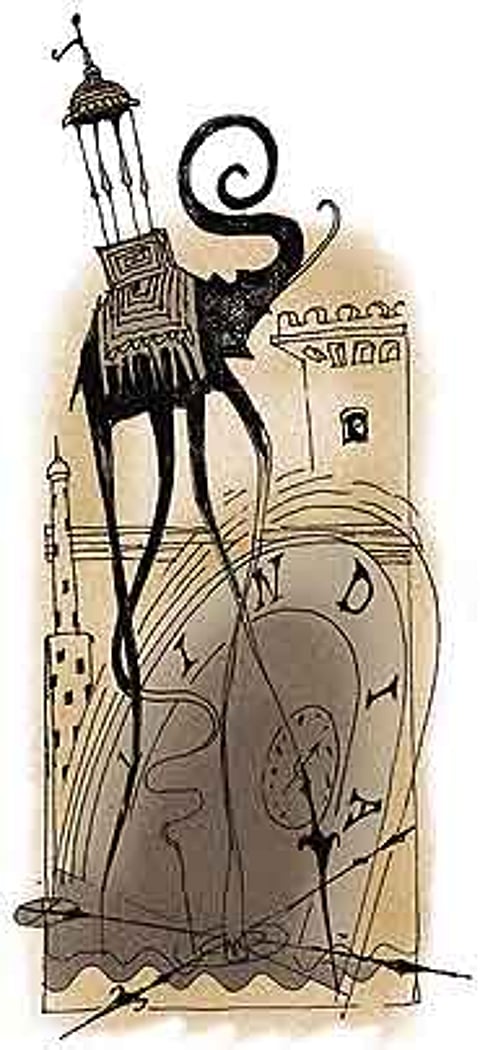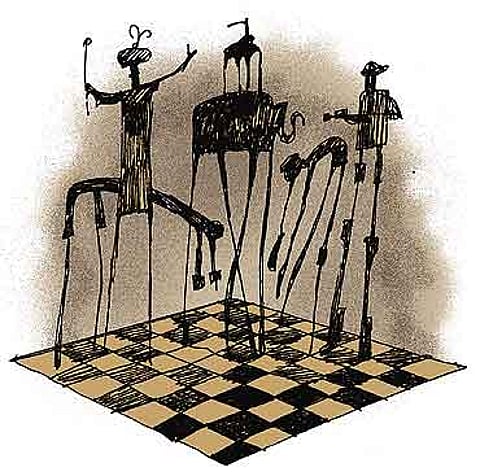My father was a Royal Navy man and I was brought up largely on navy bases, and sent to a boy's boarding school that was attended mainly by the sons of officers. The school library was full of books devoted to the romance of colonialism, and I loved to steep myself in the work of G.A. Henty and, as time went on, John Masters and Rudyard Kipling. Maharajahs, elephants, dusty plains, imposing mountains, teeming bazaars...and loyal Indian jemadars and subedars who made sturdy and trusty subordinates. The history lessons more or less repeated these tropes: we had to know about the Battle of Plassey, the Siege of Lucknow and the Black Hole of Calcutta, though if you paid attention and did a little extra reading you might discover, from Edmund Burke's impeachment of Warren Hastings, that not everything had been part of a civilising mission.
India had become independent less than two years before I was born. This fact was not yet officially in the history books and meanwhile, as Britain gradually contracted its overseas presence, falling back from Malaysia through Aden in the 1950s and 1960s, the whole subject was still a fraught one. In my family circle, it was generally assumed that India had been better governed by the Raj, and that nostalgia for British rule was widespread, and there was the occasional stab of conscience about the "scuttle" of 1947. (My father had briefly served on a warship with Earl Mountbatten and formed a low opinion of him.)
I came to take the anti-colonialist side in every argument about Cyprus, Aden, "Rhodesia", and Ireland, and made something of a study of the subject. This brought me into contact with that other British-Indian tradition—the Fabian and socialist friendship with the long struggle for Indian emancipation. As the youngest member of the committee of the Movement for Colonial Freedom, I shook hands with its oldest member, Fenner Brockway, who had been a champion of Indian rights in the House of Commons long before I was born. I read the correspondence between Edward Thompson and Rabindranath Tagore, which was evidence of a great literary and personal friendship. I went to Balliol College, Oxford, which had always had numerous Indian students, including the veteran Communist, R. Palme Dutt. I began to write for the New Statesman—which I am sure some older readers of this magazine will remember—and when I joined its staff was impressed by how many subscribers we still had in India, and by how many of our readers' letters came from there. (When I made my first visit to India, in 1979, I was equally touched by the way so many people would agree to be interviewed on the basis of this single ancestral connection.)
But by 1979, the old solidarity had frayed a bit.The proclamation of a state of Emergency by Indira Gandhi had been foreshadowed by her use of emergency powers against the railwaymen's union: an action which was covered in rather gloating terms in the New Statesman, by a reporter named Sarwar Lateef.When the full Emergency was imposed, many of the traditional British Labour friends of India—most notably Michael Foot and Jennie Lee—were ready to support it. So were old comrades of theirs in Delhi, such as the celebrated cartoonist Abu Abraham. It seemed to me that it was one thing to hail Mrs Gandhi's ruthlessness in the matter of Bangladesh in 1971, and quite another to endorse her suspension of the Constitution and her indulgence of dynastic whims on the part of her offspring. I wrote a couple of items for the magazine, focusing particularly on the imprisonment of George Fernandes, which led to quite a row within the cohort of the British pro-Congress loyalist Left. Surely the whole point of India's independence was that it had resisted all temptations to subside into post-colonial autocracy? Now we were hearing the traditional banana-republic excuses about "order" and "security" being more important than mere liberties. It was a great relief to me when the historian E.P. Thompson, son of Edward and a moral hero on the British Left, wrote an essay excoriating Indira Gandhi's arrogance and corruption. It was an even greater relief when the Indian voters took the same view a few months later.
Thus, by the time I first set foot in India, I was in a very small way the heir to two vanished or discredited mentalities: the Raj nostalgia one and the Nehru-socialist and "non-aligned" one. I covered the election that brought Mrs Gandhi back to power just after the Soviet invasion of Afghanistan, and witnessed the ridiculous confusion of the Indian 'Left'. Impressive as it was to see Jyoti Basu address huge, thoughtful crowds in Calcutta with a long and serious speech, I felt as if I was watching a wave of the past rather than the future. And I noticed that if an outside visitor, even a sympathetic one, had any criticisms, then he was always likely to be told that no further advice was required from British persons. This struck me as a symptom of insecurity, even immaturity, rather than of confidence. From the other side, so to speak, I produced two documentaries and a book, ridiculing those like the supporters of 'Bhagwan Rajneesh' in Pune, and 'Mother Teresa' of Calcutta, who regarded India as a playground for experiments or as an object of charity and condescension.

